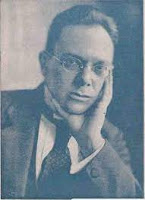by Ryan Ross
Robert Müller-Hartmann: String Quartet No. 2; Three Intermezzi and Scherzo; Two Pieces for Cello and Piano; Violin Sonata. ARC Ensemble. Chandos CHAN 20294.
Prior to this disc, almost my only awareness of Robert Müller-Hartmann was his friendship and collaboration with English composer Ralph Vaughan Williams. I knew that the former was also a composer, and had interrupted his career to flee Hitler’s Reich along with other Jewish German refugees. But I never had the opportunity to hear any of his music until now. Vaughan Williams much respected his younger contemporary and even went to hear his music performed on multiple occasions. One wonders what he thought, because if the works offered on this splendid recording are any indication, Müller-Hartmann deserves to be remembered as more than the great Englishman’s trusted assistant.
I am conscious of starting to sound like a broken record when it comes to Chandos’s tremendous advocacy for neglected composers, but we do in fact have another winner here. Part of a series titled “Music in Exile” put on by the ARC Ensemble (the featured performers) and its director, Simon Wynberg (the author of its fine liner notes), this recording treats the listener to five separate compositions (four for chamber ensembles and one for solo piano) by Müller-Hartmann. Far from being the sturdy but bland fare by “minor” composers one often encounters, this music has a real stamp of personality. No, it won’t upset our understanding of how twentieth-century music developed, nor perhaps force its main characters to make room for one more. But if a mark of music worth repeated hearings is its memorability and capacity to speak directly to the listener, these selections are firmly recommendable.
Müller-Hartmann’s strongest gift is as a melodist. His themes are not only beautiful, but they’re also full of idiosyncratic turns of phrase that help the listener remember them as something distinctive. This is particularly true of my favorite work on the disc, the Sonata for Violin and Piano, which is very much conceived thematically but contains enough contrast and drama to not overburden his tunes. While the String Quartet lacks some of the Violin Sonata’s grace and charm, it brings a sophistication of craft that one can tell came from accrued experience in the decade or more that separated these works. It is a serious and substantial composition – one that would hold its own programmed for a chamber concert alongside more familiar works in the genre.
The rest of the disc’s music is essentially collections of miniatures. This includes the brief Sonata for Two Violins, with none of its four movements lingering past a few minutes or so. To my ear, the structures owe more to repetition, contrast, and elision than to rigorous “development” in the traditional sense. But it is none the worse for that! Like the Second String Quartet, it is a fully mature composition with a touch of angularity leavening sweeter lyricism. The third movement in particular is an earworm that contrasts a driving figure with a slower, more mysterious counter-idea. I would love to hear this work in live performance some time, where I think it would be extremely effective. The remaining pieces are simply lovely miniatures that I hope will be performed more as a result of this recording.
I am sometimes critical of miniaturist composers who try, with only intermittent success at best, to work in larger forms. Even “great” miniaturist composers such as Robert Schumann and Edvard Grieg (whose music came to mind multiple times while listening to Müller-Hartmann’s) sometimes come in for criticism regarding certain “big genre” compositions. While I do consider Müller-Hartmann to be a miniaturist at his core, he is more than capable in the larger works sampled here. I understand that there are other such compositions in his catalogue, and I hope that those still unrecorded will be available in physical and streaming mediums soon. Robert Müller-Hartmann was a composer with a real voice. A wonderful discovery awaits anyone willing to take a chance on this recording.




No comments:
Post a Comment
Thank you for your comment. It will be published after review.